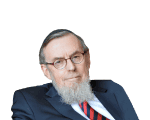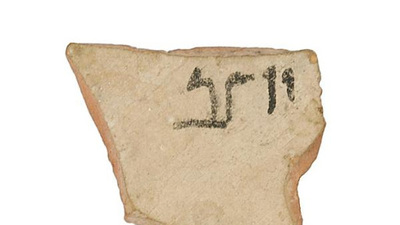The older I become, the more difficult it is. I am now 76 years old, and I have a lot of experience in learning and teaching Torah. After all, I spent twelve years in yeshivot, studying Torah the entire day while also acquiring knowledge in general philosophy. I have taught thousands of classes to secular and religious Jews and many gentiles. If I may say so, I believe I do it well. And still, something crucial is missing.
Recently, I identified the problem. It happened when I read the berakhot, blessings, prior to reciting the Haftara (the weekly reading in the prophets that follows the reading of the weekly Torah portion from the Pentateuch) in our synagogue. The person reciting the Haftara begins with a blessing that states: “Blessed are You, God (…) Who selected good prophets and desired their words that are stated in truth. Blessed are You, God, Who selects the Torah (…) and true and just prophets.”
What does it mean that prophets say their words “in truth” and that they are “true and just prophets”? Shouldn’t this be obvious? If they would not speak the truth nor be true and just, they would be false prophets!
It would seem that the word “truth” in Tanakh, the Bible, has an altogether different meaning. It is not that these great prophets could have uttered an untruth. Indeed, they spoke the truth; but this is not enough. They also had to say these words as “just prophets.” They were to be justified in saying these truthful words by living their words in total integrity. This means that these words were incorporated completely in their personalities. Their very personalities reflected the divine words they spoke. They were not just “teachers” of God’s words, but they lived these very words.
Only then were they true and just – men of truth and justice. Only then they could become real prophets, whose words would be capable of penetrating the hearts and minds of all who came to listen to them. This is only possible when their divine words emanated from God Himself; but to have any effect, they had to become men who lived God’s words entirely in every fiber of their beings.
These words had to be very different from the words of men; they would not just be words as those in the works of Shakespeare or Goethe. The words of the prophets are to be transformative, accomplishing something which is nearly impossible: the creation of a new, enlightened human being who possesses refined characteristics and an elevated spiritual temperament.
This is explained very well by the prophet Isaiah: “As sure as rain and snow descend from the heavens and do not return until [they] have irrigated the soil, making it bud and flourish, so that it yields seed for the sower and bread for the eater, so shall be the word that goes forth from My mouth: it shall not return to Me void, but it shall accomplish what I desire and succeed [in the matter] wherefor I have sent it.” (Yeshayahu 55:10,11).
The prophets made themselves into the vehicles of God’s words and, thus, made others tremble and henceforth blossom. Once these words came from their very essence, the effect was tremendous.
Nobody could escape true prophets. Everybody, even the atheist, could not ignore them. These words were so powerful that it was as if they had ignited a fire within every human being. These words penetrated so deep that it was obvious that these words were the truth and nothing but the truth.
It is related of the renowned Rabbi Yisrael Salanter (1809-1883), the founder of the Musar movement and its highly ethical teachings, being asked who his major teacher was. He replied that it was Rabbi Zundel Salanter (Yosef Zundel of Salant, 1786-1866). When asked how long he had studied under him, Rabbi Yisrael answered: “Never; I only saw him once!” Simply beholding Rabbi Zundel Salanter was enough to transform his whole life!
Teaching does not mean conveying knowledge, but to convey one’s whole personality, not just one’s mind. Every fiber in one’s body teaches. Every deed sends a message.
As long as one is a dual personality existing of an “I” with the Torah alongside, one does not live up to the necessary “true and just” identity. One is a “split personality.”
People like Rabbi Yisrael Meir HaKohen of Radin, the “Chafetz Chaim”; Rabbi Avraham Yitzchak Kook, the Chief Rabbi of Palestine; Rabbi Professor Abraham Joshua Heschel; Rabbi Yosef Rosen, the Rogatchover Gaon; Chacham Ben-Zion Meir Hai Uziel, the first Sephardic Chief Rabbi of Israel; Sephardic Chief Rabbi Chacham Yitzhak Nissim; Chief Rabbi Lord Jonathan Sacks and many others like them stood for this truth and justice.
It shone forth from their very personalities. They were “walking Torah scrolls”; and even non-religious Jews and gentiles were taken aback by their personalities. Hence they could not resist these personalities.
It is famously recounted of Rabbi Avraham Yitzchak Kook who would visit the most left wing, anti-religious Hashomer Hatzair kibbutzim and spend Shabbat there. He brought his own kosher food, cutlery, kiddush cup etc. to the kibbutz because nothing was kosher. He prayed on his own and made kiddush in the dining room, sang Shabbat (Sabbath) songs, and said grace while the Hashomer Hatzair members sat around him and even joined in. They could not stop themselves! He would then begin to converse with the kibbutz residents, as more and more joined in. After Shabbat, he told them that he would come back because he had so enjoyed Shabbat with them. They all started to cheer. And he blessed them.
Indeed, he was such a balanced holy personality and great Torah scholar that he slowly became a “living Sefer Torah.” When the kibbutz members were asked why they loved him so much although their philosophies were worlds away from those of Rabbi Kook, they answered: “We cannot resist him. He is a living Sefer Torah! He spoke truth and justice. He rips our chests open and our hearts jump out!“
It seems that we no longer have people around us who live up to this and are able to have this kind of influence.
And that is what I am missing. When shall I be able to say the berakhot of the Haftarah and the prophetic words I recite in synagogue in a way that I realize that they are not only the truth but also righteous and just, and that I feel this throughout the whole of my personality and really be transformed by them?
Only when I undergo this transformation of integrating Torah into every fiber of my being will I be able to teach real Torah effectively!




